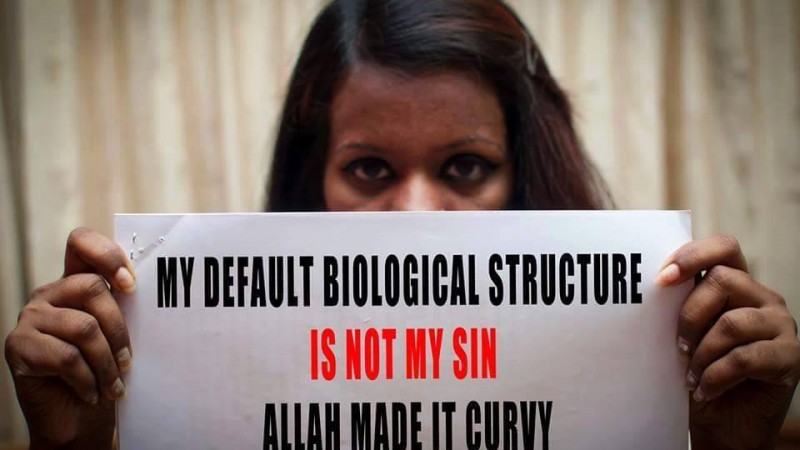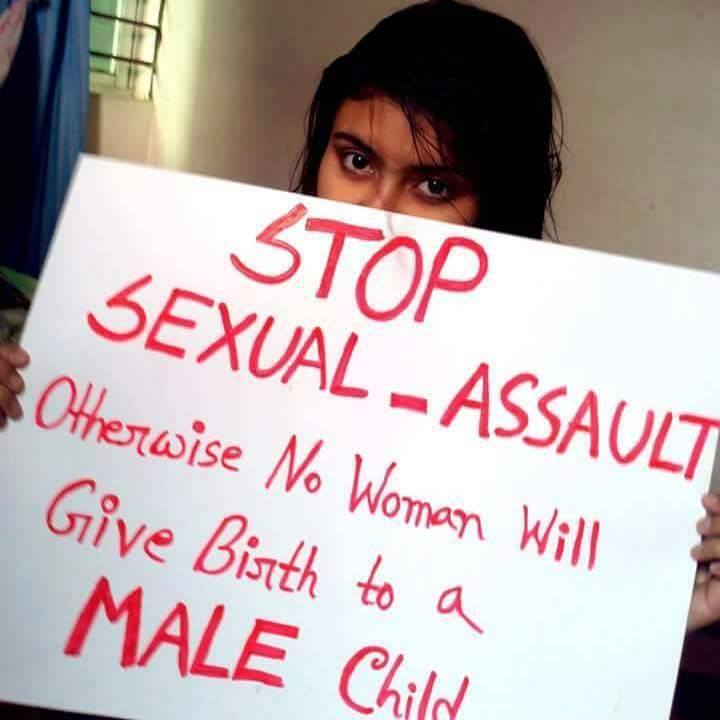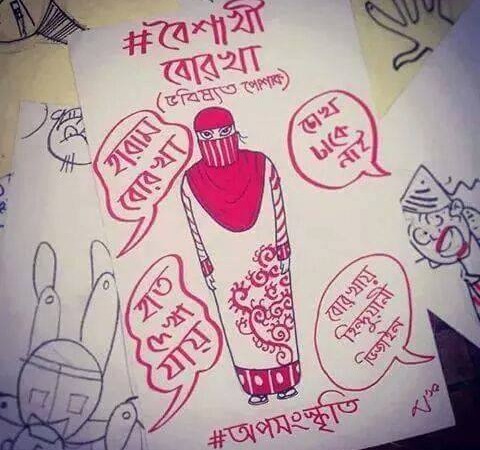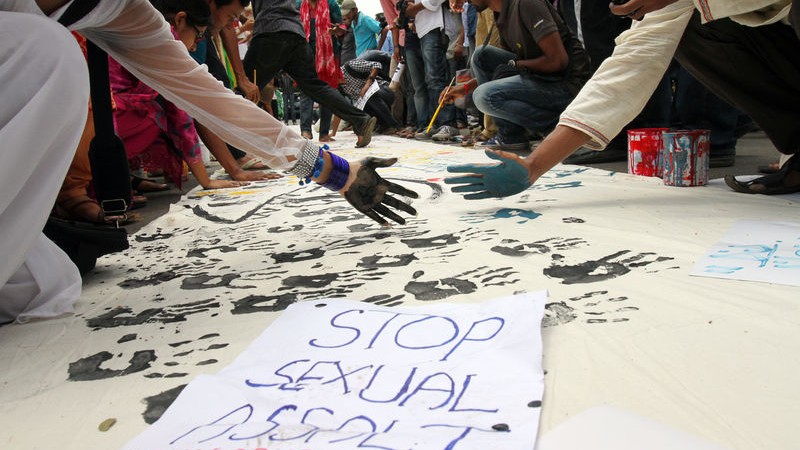
Online protests against sexual assault in Bangladesh. Photo: হোক প্রতিরোধ/Hok Protirodh (Lets Resist) Used with permission.
People are protesting online and offline in Bangladesh after several women were sexually molested at University of Dhaka during the Bengali New Year celebrations.
What happened on the evening of April 14, 2015, in Dhaka was not only deplorable but also shocking. Closed-circuit television video footage showed a group of 30 to 40 young men assaulting and sexually harassing around 20 women at the Shuhrawardy Udyan park near the Teachers Student Center area as the women returned home from celebrating the New Year.
Some witnesses tried to intervene, activist Liton Nandi being one of them. He broke his arm in the process and told bdnews24.com:
one woman fell down when the rouge youths started assaulting her and tried to take her clothes off in public. They started beating me when I tried to save her. I collapsed too and broke my arm during the attack.
Authorities initially said they knew nothing of the assaults, despite the fact that these incidents played out in front of hundreds of people, were captured on film and police were in the area at the time managing the crowd. Five days later, police finally acknowledged the assaults, but downplayed them. They also disclosed that one of the perpetrators was handed over to police, but later set free. The country's High Court has ordered the inspector general of police and Dhaka University vice chancellor to submit reports on what steps are being taken to punish the guilty.
While the police have not identified or arrested anyone, Facebook and Twitter users have pored over the photos and stills to identify the assailants.

Online protests against sexual assault in Bangladesh. Photo: হোক প্রতিরোধ/Hok Protirodh (Lets Resist) Used with permission.
The incident sparked outrage, and some have channeled their anger into innovative protests. The students of University of Dhaka's Institute of Fine arts barricaded Shahbag police station and presented the police with women's clothes, bangles and lollipops protesting their inaction on the issue.
On social media, videos and photos have gone viral of individuals expressing their indignation over the ineffectiveness of authorities and inaction of the eyewitness. Celebrity Mumtaheena Buni Toya posted a video speaking out, which was viewed by more than 150,000 people.

Translation: #Boishakhi Burkha – Fashion of the future – And still the victim gets these comments – “Haram Burkha”, “The eyes are visible”, “You can see the hands”, “foreign culture”, “The Burkha has Hindu designs”. Image via হোক প্রতিরোধ/Hok Protirodh (Lets Resist) Used with permission.
Numerous Facebook community pages have been created, including the ones called ‘hok protirodh‘ (Let's Resist) and Stand By Her, asking women to take a stand against sexual violence.
Blaming the victim
Aantaki Raisa, a journalist, expressed her frustration in a Facebook video post over the mentality that the women should be blamed for their own assault:
“ও অমন কাপড় ক্যান পরছে? ওরা ওইখানে ক্যান ছিল? ইজ্জত বাঁচাইতে চাইলে অমন জায়গায় যাইত না।” ধর্নষকারীদের মধ্যে ভিক্টিম ব্লেমিং খুবই কমন মেন্টালিটি। ভিক্টিম ব্লেমিং জিনিসটা অনেকটা এরকম: ধরেন আপনার বাসায় ডাকাতি হইছে এবং মানুষ বলতিসে…ভাই এত দামী জিনিস ক্যান কিনসিলেন?টাকা পয়সা বাসায় ক্যান, ব্যাংকে সব রাখা উচিত, কার্ড ইউজ করবেন… ভাই বাসায় পুলিশ রাখলে এমন হইত না। ভাই এখানে ক্যান বাসা নিতে গেলেন? ডাকাতের কাছে নিজের সম্পত্তি হারায় এমন কথা শুনলে কেমন লাগতে পারে? ভাবেন একটা মানুষ যখন ধর্ষিত হয়, তার শরীরের সবচেয়ে সেনসিটিভ জায়গা যখন ক্ষতবিক্ষত হয়, তখন তাঁর এমন কথা শুনে কেমন লাগতে পারে। যখন রাস্তা ঘাটে অন্যের হাত এসে আপনার কাড়প টেনে ছিঁড়ে ফেলে, তখনই বা এমন কথা শুনলে কেমন লাগে?
“Why did she wear such clothes? Why were they there? If they cared about their honour they would not go to such a place.” This is a common trend among rapists — blaming the victims. Their logic is this: For example, your house gets robbed and people scold you over owning such expensive things. You should have kept all your valuables in the bank vault.. use only debit or credit cards…you should have employed a security guard at home. Then they would go on.. why did you rent a house in this vulnerable area? How would you feel after being robbed of your belongings? Just imagine when a girl is raped, their sensitive organs are hurt, how would they feel hearing such logic? When in the streets girls get molested and their clothes are ripped, how would they feel if you say such things?
Some of the blame-the-victim rhetoric has come from extremist religious groups, which have gained influence in recent years in Bangladesh. Shah Ahmed Shafi, the chief of fundamentalist Islamic group Hefazat-e-Islam, commented that the assaults happened because women were not modest in their dress. He also blamed co-education and urged for the separation of men and women in educational institutions and workplaces.
In turn, the chief of Bangladesh's National Human Rights Commission blamed the sexual assaults on religious fanaticism and patriarchal systems.

Students create a banner with black handprints as they rally around Dhaka University to protest incidents of sexual harassment on the campus during Bengali New Year celebrations. Image by Sk. Hasan Ali. Copyright Demotix (20/4/2015)
Senior journalist Farzana Rupa said that she received a death threat from a person identifying himself as the deputy chief of an Islamic militant organisation minutes after Ekattor TV broadcast her report on 18 April about the assaults. The station had analyzed a one-hour-long video captured by closed-circuit television installed by police on campus.
If religious fundamentalists are really behind this coordinated assault, it would not be the first time that the New Year's festival, termed contrary to the culture of Islam, became a target. In 2001, a bomb blast killed nine people in the capital near the University of Dhaka campus.







8 comments